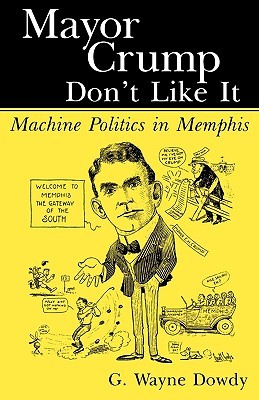
- We will send in 10–14 business days.
- Author: G Wayne Dowdy
- Publisher: University Press of Mississippi
- Year: 2008
- Pages: 168
- ISBN-10: 1604731133
- ISBN-13: 9781604731132
- Format: 14 x 21.6 x 1.1 cm, softcover
- Language: English
- SAVE -10% with code: EXTRA
Reviews
Description
In the 1930s thousands of African Americans abandoned their long-standing allegiance to the party of Abraham Lincoln and began voting for Democratic Party candidates. This new voting pattern remapped the nation's political landscape and altered the relationship between citizen and government.
One of the forgotten builders of this modern Democratic Party was Memphis mayor and congressman Edward Hull Crump (1874-1954). Crump created a biracial, multiethnic coalition within the segregated South that transformed the Mississippi Delta's largest city into a modern southern metropolis. Crump expanded city regulatory power, increased government efficiency and established a publicly owned electric utility. In addition, he secured a comprehensive flood control system for portions of the lower Mississippi River Valley. G. Wayne Dowdy cataloged the personal papers of Crump for the Memphis Public Library and brings southern political history to life in this biography.
In the 1930s Crump emerged as a national leader who influenced the direction of American politics. In 1936 Time described Crump as one of the South's most remarkable politicians. A political advisor to Franklin Roosevelt, Crump convinced a large number of blacks to abandon their allegiance to the Republicans for the party of FDR. Ironically, Crump's power and influence ebbed over the course of the 1940s in large part due to the increasing independence of black voters seeking to desegregate Memphis and the South. Determined to maintain segregation, Crump abandoned the Democrats in 1948 for the States' Rights Party and experienced a crushing political defeat.
G. Wayne Dowdy is a senior librarian and archivist at the Memphis Public Library and Information Center. His work has appeared in the Arkansas Review: A Journal of Delta Studies, CrossRoads: A Southern Culture Annual, Journal of Negro History, Tennessee Historical Quarterly, and other publications.
EXTRA 10 % discount with code: EXTRA
The promotion ends in 19d.03:27:36
The discount code is valid when purchasing from 10 €. Discounts do not stack.
- Author: G Wayne Dowdy
- Publisher: University Press of Mississippi
- Year: 2008
- Pages: 168
- ISBN-10: 1604731133
- ISBN-13: 9781604731132
- Format: 14 x 21.6 x 1.1 cm, softcover
- Language: English English
In the 1930s thousands of African Americans abandoned their long-standing allegiance to the party of Abraham Lincoln and began voting for Democratic Party candidates. This new voting pattern remapped the nation's political landscape and altered the relationship between citizen and government.
One of the forgotten builders of this modern Democratic Party was Memphis mayor and congressman Edward Hull Crump (1874-1954). Crump created a biracial, multiethnic coalition within the segregated South that transformed the Mississippi Delta's largest city into a modern southern metropolis. Crump expanded city regulatory power, increased government efficiency and established a publicly owned electric utility. In addition, he secured a comprehensive flood control system for portions of the lower Mississippi River Valley. G. Wayne Dowdy cataloged the personal papers of Crump for the Memphis Public Library and brings southern political history to life in this biography.
In the 1930s Crump emerged as a national leader who influenced the direction of American politics. In 1936 Time described Crump as one of the South's most remarkable politicians. A political advisor to Franklin Roosevelt, Crump convinced a large number of blacks to abandon their allegiance to the Republicans for the party of FDR. Ironically, Crump's power and influence ebbed over the course of the 1940s in large part due to the increasing independence of black voters seeking to desegregate Memphis and the South. Determined to maintain segregation, Crump abandoned the Democrats in 1948 for the States' Rights Party and experienced a crushing political defeat.
G. Wayne Dowdy is a senior librarian and archivist at the Memphis Public Library and Information Center. His work has appeared in the Arkansas Review: A Journal of Delta Studies, CrossRoads: A Southern Culture Annual, Journal of Negro History, Tennessee Historical Quarterly, and other publications.


Reviews